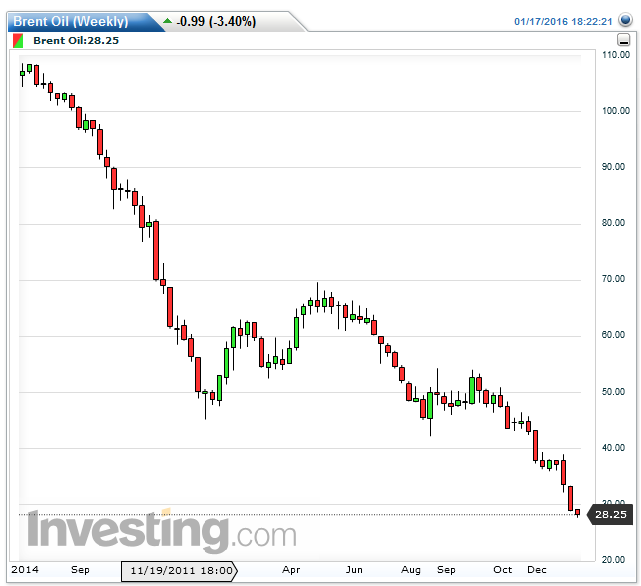Futures this evening show Brent Crude is just over $28 a barrel, down another 3.4 percent. At one point futures were $27.67.

Meanwhile, US West Texas Intermediate (WTI) sits at a relatively firm price near $30. The key word being “relatively”, not firm.
Sanctions Lifted
The Wall Street Journal reports
“The EU has confirmed that the legal framework providing for the lifting of its nuclear-related economic and financial sanctions is effective. The United States today is ceasing the application of its nuclear-related statutory sanctions on Iran,” said EU foreign policy chief Federica Mogherini, reading the joint statement.
The Guardian reports Lifting of Iran Sanctions is ‘a Good Day for the World’.
I agree, having previously commented “Obama’s deal with Iran was the single best thing he has done in eight years“.
Warmonger Republicans and Israel would not agree, but most of the world is on my side.
Winners and Losers
The end of sanctions does mean that Iran will be free to sell its oil.
The biggest beneficiary is consumers. The biggest losers are the other oil producing states, the warmongers, and Israel.
Life Worse for Saudi Arabia
Bloomberg says Iran’s Oil Will Just Make Life Worse for Gulf Rivals.
Governments across the six-nation Gulf Cooperation Council are taking unprecedented measures to counter the slump in oil prices, curtailing some of the world’s most generous welfare systems to plug widening budget deficits. In some countries, contractors are facing delays in government payments, while companies are reducing their workforces to trim costs.
Every major stock index in the Middle East, with the exception of Tehran’s, plunged on Sunday as the prospect of Iran adding to an oil supply glut pummeled markets already reeling from falling crude prices and a global sell-off in equities. With oil priced below $30 a barrel, governments may have to eat further into benefits that citizens have enjoyed for decades — at a time of growing regional turmoil and a proxy confrontation with Iran from Syria to Yemen.
The Saudi Arabian central bank’s net foreign assets fell by $96 billion in the first 11 months of 2015 to $628 billion, and the government sold bonds for the first time since 2007 to finance a budget deficit of about 15 percent of economic output.
“The political contract between the rulers and the citizens is based on a provision of wealth to the citizens, so any adjustment of the subsidies or of the other services will have some political risk,” said Toby Matthiesen, senior research fellow at the University of Oxford and author of “The Other Saudis: Shiism, Dissent and Sectarianism.”













Leave A Comment